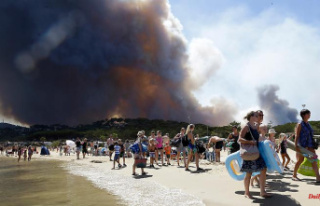The Oder, as the border river between Germany and Poland, is largely a national park. The fish kill alone is a catastrophe, but the consequences for other animal species are not yet foreseeable. Meanwhile, the search for the causes is ongoing.
The causes have not yet been clarified beyond doubt - but according to the estimates of Brandenburg's Environment Minister Axel Vogel, the consequences of the fish kill in the Oder will be felt for a long time. "For the Oder as an ecologically valuable body of water, this is a blow from which it will probably not recover for several years," said the Green politician in Schwedt during a visit to the region. The fish stocks would first have to be rebuilt slowly. Federal Environment Minister Steffi Lemke said: "Here an environmental catastrophe is imminent."
The mass extinction of fish continues to pose a mystery. "Our problem is that we are still groping in the dark, so we don't know which substances were actually introduced into the Oder," said Vogel. "We have indications from the Polish side that around July 28 near Oppeln, i.e. near Wroclaw, substances got into the Oder that caused fish to die there." Vogel confirmed that mercury pollution had been found in the Oder - "but at the present time we cannot make any statement that mercury is responsible for the death of the fish".
A combination of several factors such as heat, low water supply and toxins is possible. "It may well be that these are substances that have been introduced into the Oder for a long time, but normally do not pose a problem at all with medium water," said Vogel. However, there are currently historical low water levels on the Oder. This increases the concentration of all substances in the water. It has now been clarified that fish are also dying in Germany and that it is not just dead animals that have washed up from Poland, said the Environment Minister.
Conservationists assume far-reaching consequences for the Lower Oder Valley National Park. "This is simply a disaster for the national park," said Deputy National Park Manager Michael Tautenhahn. The poisoning wave went completely through the Oder. Dead fish were seen floating across the entire width of the river. Zander, catfish, gudgeons and loach are affected. Sea eagles and other birds could ingest poison from the dead fish. The Lower Oder Valley National Park is one of the most species-rich habitats in Germany.
In the meantime, there has been increasing criticism of the Polish authorities. The Federal Ministry for the Environment complained that the reporting chain that is usual for such events had failed. "In fact, we know that this reporting chain, which is intended for such cases, did not work," said a spokesman. What is meant is the early reporting of fish deaths on the Polish side.
According to the Federal Environment Ministry, it is in contact with the Polish government, the local Ministry of Infrastructure and the Polish Embassy. The house is also in contact with the Brandenburg authorities, who are primarily responsible for the processing. "We now need clarity about the substances that are actually in the water there." So far, the authorities are still faced with an "incomplete picture".
According to the Polish Environmental Protection Agency, the fish kill was likely caused by industrial water pollution. Poland will be able to present the test results of masses of dead fish from the Oder on Sunday at the earliest. So far, the State Research Institute in Pulawy has not received any fish, head Krzysztof Niemczuk told the PAP news agency. The fish are to be examined for metals, pesticides and other toxic substances.
The district administrator for the Uckermark district, Karina Dörk, said that the area along the Oder will be flown over with drones to see how the fish kill is developing. An operation to collect the dead fish is planned on the German side for this Saturday.












